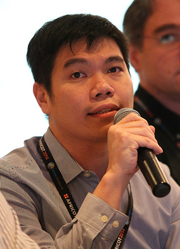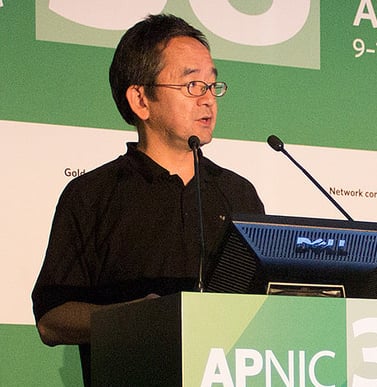
Happy New Year!
With a new year comes new opportunities, and APNIC asked the Asia-Pacific numbering community for some thoughts on 2014, and predictions for the Internet in 2015.
Here’s what our respondents said. Do you agree? Join the discussion in the comments section below.
What will you remember most about the Internet in 2014?
The announcement by NTIA on the IANA stewardship transition.
Izumi Okutani, JPNIC
I think major development in Internet world in 2014 is the adoption of smart phone and proliferation of mobile apps in diversified areas, especially based on Android.
Sumon Ahmed Sabir, BDCOM
The IANA Functions’ Stewardship Transition.
Ai-chin Liu, Vice Executive Director at TWNIC
I will always remember Saturday 15 March. The US Government had announced its intention to transfer its stewardship of the IANA Functions to the global multistakeholder community. The global community is at a historical juncture right now and we should seize the opportunity at hand.
Yu-Chuang Kuek, VP and Managing Director APAC, ICANN
A lot of significant and world-changing events happen every year thanks to the Internet. But for Bhutan specifically in 2014, I will remember the setup of Bhutan Network Operator Group (BTNOG), which I am confident will bring immense benefits to the network operators and engineers in Bhutan, thus making difference in the way they run networks and network services.
Tshering Norbu, DrukNet, Bhutan Telecom
The NTIA announced the IANA function transition.
Xing Li, Deputy Director, China Education and Research Network (CERNET)
As a person who has been working in both Name field and Number field, IANA Functions Stewardship Transition is certainly the most memorable thing about Internet in 2014.
Wendy Zhao, CNNIC and APNIC Executive Council Member
The things I will remember most were the global outrage against gross violations of privacy from surveillance from governments; the storm in a teacup experience of geopolitical turf wars; the expansion of the dialogue regarding NetMundial; and the surge in number of users of the Internet as opposed to previous years.
Salanieta Tamanikaiwaimaro, Manager, Japan Pacific ICT Centre at The University of the South Pacific
Everything cloud-based.
Alounnadeth Barnchit, Lao Telecommunications
2014 was the year of NETmundial and kick-off of IANA Stewardship Transition.
Akinori Maemura, JPNIC, and Chair, APNIC Executive Council
It’s the year that I found the most vibrant traffic ever to social networking sites — Facebook, Twitter and YouTube.
Heng Vannak, Core Network Manager, Cogetel, Cambodia
The most prominent trend in my view has been the growth of the mobile Internet. Approximately five times as many mobile devices (smartphones + tablets) were shipped this year as compared to the number of PCs (desktops + laptops). Combined with the rapid spread of mobile broadband (with mobile data usage growing at roughly 80%), this means that we are well and truly in the mobile age. This has profound implications for device manufacturers, software and app designers, and telecom networks, all of whom are having to adapt to a rapidly changing situation.
Dr Ajay Kumar, Department of Electronics & Information Technology and Director General, National Informatics Centre, Government of India
I think this is a year where we saw closer interest in the Internet from governments in the APAC region in particular. Whilst some of it had to do with various multilateral meetings this year, there also appeared to be greater interest in content filtering and blocking by some governments.
Rajnesh Singh, Regional Director of the Asia-Pacific Regional Bureau at the Internet Society
What do you think will be the big issue facing the Internet in the Asia-Pacific in 2015?
Some major global Internet attacks (DDos attacks) happened this year. I believe that Internet security will still be the big issue in the Asia Pacific next year.
Ai-chin Liu, Vice Executive Director at TWNIC
Over three years have passed since the run out of APNIC’s unallocated IPv4 address blocks in April 2011. IPv4 address blocks to be available via transfers are not infinite either, with more regions with their RIRs’ pools exhausted. How do we accommodate growth in the Asia-Pacific with limited availability of IPv4 distributions, while making choices about transition technologies that maintains the essence of the Internet we are using today?
Izumi Okutani, JPNIC
What I feel is that, major big issue is the governments role on Internet Governance. Due to massive popularity of social networking sites it has a huge political and social impact in both national level and in personal level. Many governments are now in search of how to filter the content and to intercept the content flowing through Internet. This may cause a major impact on the present Internet structure and its operation.
Sumon Ahmed Sabir, BDCOM
It could be the difficulty of traffic travelling within the region. As ASEAN community comes in effective next year, a lot of business will require the region to become as a single network. So far, we haven’t found the true medium of that taking place.
Heng Vannak, Core Network Manager, Cogetel, Cambodia
Universal Service is a significant issue as there still remains many who live in under served regions within Asia Pacific. Geopolitically, China has great influence in the evolution of key developments in the Pacific and has already been planning to build alternative global submarine cables to its allies. For critical Internet resources, that is domain names and IP addresses, Whois accuracy is important. Spam will continue to be an issue for Small Island Developing States in the Pacific. Protecting the global public interest in the policy space within Asia Pacific.
Salanieta Tamanikaiwaimaro, Manager, Japan Pacific ICT Centre at The University of the South Pacific
The stewardship transition will be a key topic globally and in Asia Pacific next year. As the deadline draws near, all eyes will be on the proposals that the various communities are submitting and on the eventual proposal that will be presented to the US Government. We’re pleased that the numbering community here led by APNIC was one of the first groups to meet and discuss the transition and put forth its recommendation. As Asia Pacific is home to more than half of the world’s Internet users, it is important to ensure that our needs and concerns are addressed. I’d like to call on all stakeholders in the region to continue to actively participate in this important discussion.
Yu-Chuang Kuek, VP and Managing Director APAC, ICANN
Lack of the IPv4 addresses and slow transition to IPv6.
Xing Li, Deputy Director, China Education and Research Network (CERNET)
In my opinion, the big issue of 2015 is still Internet governance. How to regulate the flexible development of the Internet is a great challenge. This challenge is particularly prominent in the Asia Pacific region, because many of economies in this region are in a rapid development period. Huge market space leads to fast growth of the industry. But management and management philosophy lag behind the market. If management thinking is wrong, it will lead to negative effect on the development of the market.
Wendy Zhao, CNNIC and APNIC Executive Council Member
I think the big issues will be related to cyber security threats, migration to IPv6 and Internet censorship by some governments.
Tshering Norbu, DrukNet, Bhutan Telecom
IPv4 to IPv6 transition.
Alounnadeth Barnchit, Lao Telecommunications
IPv6 deployment. Three years has past since IPv4 address pool depletion, ISPs have been keen to secure the needed IPv4 address space by squeezing the space from their network and by procuring by the transfer. With the strong demand in developing economies, the severity with the shortage of IPv4 address space will be much more significant.
Akinori Maemura, JPNIC, and Chair, APNIC Executive Council
Access will be the most important issue facing this region, since as many as two-thirds of its people lack an Internet connection. In the midst of some of the complex issues facing the Internet in the coming year including the IANA transition, it is important not to lose sight of the basic fact that Internet access is far from universal, and that the opportunities lost by those who do not have access keep multiplying as more and more aspects of our lives go online.
Dr Ajay Kumar, Department of Electronics & Information Technology and Director General, National Informatics Centre, Government of India
I believe with the growing convergence of technologies, platforms and applications, questions and concerns around online privacy and data protection will continue to be a major issue. Much greater attention will need to be paid to how data is used, stored and shared.
Rajnesh Singh, Regional Director of the Asia-Pacific Regional Bureau at the Internet Society
What do you think is the biggest opportunity or challenge facing the Internet numbering community in 2015?
Speaking of number community, I think lack of IPv4 resources and routing security will be still the biggest challenges of 2015. And we cannot see those issues can be solved in short time due to the situation of awareness and deployment of IPv6 and RPKI.
Wendy Zhao, CNNIC and APNIC Executive Council Member
I do believe both the biggest opportunity and challenge facing the Internet numbering community lies in convincing and helping migrate to IPv6.
Tshering Norbu, DrukNet, Bhutan Telecom
The Internet of Things.
Alounnadeth Barnchit, Lao Telecommunications
There is work to be done outside purely number policies, and related to technologies on number resources, such as DNS, routing and IPv6. In terms of security, there is more work we can look at and possibility engage to addressing DNS incidents/vulnerabilities, on how we can effectively work as a community. This could apply in routing as well. It would also be good if we could collaborate and exchange information with other communities such as CERTs as well as law enforcement agencies, related to use of WHOIS or any other areas we could work together.
Izumi Okutani, JPNIC
I think again IPv6 Adoption and DNSSEC adoption will be the major challenges and opportunities for the Internet numbering community in 2015
Sumon Ahmed Sabir, BDCOM
The usage of IPv6. It is required more supports from the device manufacturers and service providers to let IPv6 enabled.
Ai-chin Liu, Vice Executive Director at TWNIC
The IPv4 – IPv6 transition discussion remains central and we will need to work together, with leadership of players such as APNIC, to further drive adoption. The transition will require training, testing and monitoring so a lot of work remains to be done.
Yu-Chuang Kuek, VP and Managing Director APAC, ICANN
IANA Function transition and IPv6 transition.
Xing Li, Deputy Director, China Education and Research Network (CERNET)
Internet Governance issues as the challenge. IANA Stewardship Transition will enter into the phase of the integrating Community’s proposal to NTIA, the examination by it, and the acceptance and implementation. It would be critical to the Numbers Community to have favorable setup of new stewardship mechanism for future stability of our resource. Additionally, IG discussions toward WSIS+10 review at UNGA and with the proposed NETmundial Initiative will be the big discussion.
Akinori Maemura, JPNIC, and Chair, APNIC Executive Council
2015 could be the year of IPv6 real usage in the region. This is partly because of high demand from ASEAN economic community.
Heng Vannak, Core Network Manager, Cogetel, Cambodia
The biggest opportunity and challenge in 2015 will be the exponential increase in devices connected to the Internet as the Internet of Things becomes a reality. This makes it even more important to have a successful transition from IPv4 to IPv6, and it will be crucial for numbering policies and procedures to keep pace with the demand for resources, and for number resources to be efficiently delegated.
Dr Ajay Kumar, Department of Electronics & Information Technology and Director General, National Informatics Centre, Government of India
The biggest opportunity for the numbering community is the capacity to keep a steady and calm hand in the midst of the global melodrama surrounding the Internet governance geopolitical discussion. Also, the community represents live patterns of what collaboration is on both a macro and micro scale and there is a need to build the next generation Internet numbering communities through reaching out to the young in schools, tertiary institutions and increasing and expanding outreach and partnership with diverse stakeholders but especially governments and key organisations.
Salanieta Tamanikaiwaimaro, Manager, Japan Pacific ICT Centre at The University of the South Pacific
The continuing growth of IPv6 uptake is very encouraging, and I look forward to 2015 recording further growth. The IANA transition matter will dominate much of discussions at the policy level I think.
Rajnesh Singh, Regional Director of the Asia-Pacific Regional Bureau at the Internet Society
What do you think 2015 holds? Add your comment below!
The views expressed by the authors of this blog are their own and do not necessarily reflect the views of APNIC. Please note a Code of Conduct applies to this blog.




